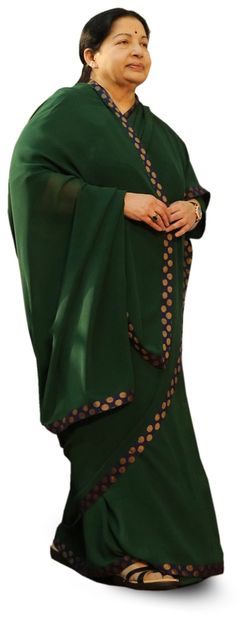Her relief, after all, seems to be short-lived. The Karnataka government has decided to challenge the acquittal of Tamil Nadu Chief Minister J. Jayalalithaa and three others in the 18-year-old disproportionate assets case. Even as she prepares to contest the R.K. Nagar bypoll on June 27, the state is gearing up to file an appeal in the Supreme Court against the Karnataka High Court's acquittal. It has retained B.V. Acharya as the special public prosecutor, and has claimed reimbursement of the expenses for fighting the case on behalf of the Tamil Nadu government for the last 13 years—the amount adds up to Rs5.72 crore.
 On the backfoot: J. Jayalalithaa | PTI
On the backfoot: J. Jayalalithaa | PTI
The move is most likely to redefine the political atmosphere, while further straining relations between Karnataka and Tamil Nadu, who are already at loggerheads over the Cauvery river water-sharing and Mekedatu project. Sources said both the Congress and the BJP might soft pedal on the case as the AIADMK has 11 seats in the Rajya Sabha, which is the new political battleground.
The Congress government in Karnataka arrived at the decision during a cabinet meeting held recently, which, according to sources, was the culmination of long deliberations with the party high command. Law and Parliamentary Affairs Minister T.B. Jayachandra said, “It is the duty of the state to file an appeal as it is the sole prosecuting agency. Karnataka is not the petitioner in the case. We have 90 days to go for an appeal. We have retained Acharya as SPP and appointed Sandesh Chouta to assist him.”
A day after Jayalalithaa’s acquittal, Acharya had claimed that the verdict given by Justice Chikka Rachappa Kumaraswamy had “glaring arithmetic errors”, and was a “fit case” for a special review petition in the apex court. His recommendation for an appeal was seconded by state advocate-general Ravivarma Kumar.
The High Court verdict, based on the premise that Jayalalithaa’s assets did not exceed the 10 per cent mark over her known sources of income, came under public scrutiny after Acharya's claims. In his verdict, Justice Kumaraswamy had noted that “the trial court has not appreciated the evidence in proper perspective. It has not considered loans [availed through Indian Bank] as loan…. It was difficult to infer that the properties were acquired by means of ill gotten wealth…. The judgment suffers from infirmity and it is not sustainable in law.”
Countering the observation, Acharya said, “If the arithmetic error is rectified, then the quantum of disproportionate assets of Jayalalithaa will be in excess of 76 per cent, against 8.12 per cent as arrived at by Justice Kumaraswamy.” The prosecution has been “seriously prejudiced” in the case as it was “denied the opportunity to convince the High Court through oral arguments”, he said.
On April 27, the Supreme Court ruled the appointment of Bhavani Singh as SPP by Tamil Nadu government as “bad in law”. It also noted there was “no need for fresh hearing” in the case, which led to Acharya, who was reappointed as SPP by the Karnataka government, filing written submissions.
Said former Lokayukta Justice Santosh Hegde, “The apex court, which said the appointment of Bhavani Singh was bad in law, should have given the Karnataka government and the new counsel an opportunity for oral arguments. Perhaps, the errors in the verdict could have been avoided as it would be contended during the arguments. On the basis of the records before him, if the judge could commit such a grave mistake and acquit someone accused under the Prevention of Corruption Act, especially when corruption is so prevalent today, it is callousness.”





